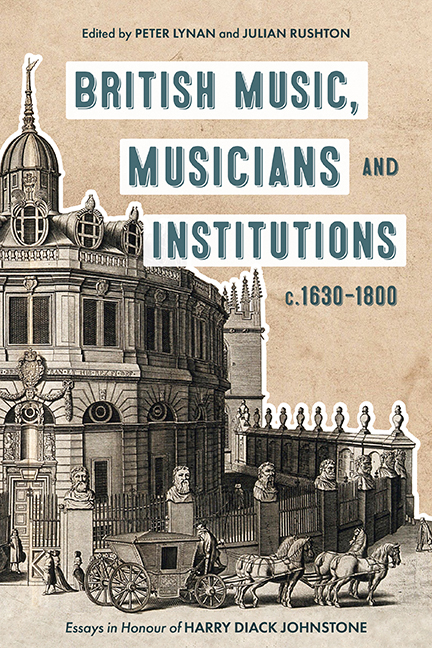Book contents
- Frontmatter
- Contents
- List of Illustrations
- List of Music Examples
- List of Contributors
- Acknowledgements
- List of Abbreviations
- Note to the Reader
- Introduction
- Part I Performers and Performance Style
- Part II Composers and Secular Institutions
- Part III Sacred Music and Institutions
- Part IV Dissemination: Copying, Printing, and Publishing
- Epilogue: Musica Britannica and the Eighteenth Century
- Harry Diack Johnstone: A Tribute
- Bibliography of the Publications of Harry Diack Johnstone
- Index
- Tabula Gratulatoria
6 - From ‘Fowle Originall’ to ‘Printed for the Author’: The Autograph Score of William Croft’s ‘Laurus cruentas’
Published online by Cambridge University Press: 06 October 2022
- Frontmatter
- Contents
- List of Illustrations
- List of Music Examples
- List of Contributors
- Acknowledgements
- List of Abbreviations
- Note to the Reader
- Introduction
- Part I Performers and Performance Style
- Part II Composers and Secular Institutions
- Part III Sacred Music and Institutions
- Part IV Dissemination: Copying, Printing, and Publishing
- Epilogue: Musica Britannica and the Eighteenth Century
- Harry Diack Johnstone: A Tribute
- Bibliography of the Publications of Harry Diack Johnstone
- Index
- Tabula Gratulatoria
Summary
In 2006 the Bodleian Library acquired, thanks to the generosity of the Friends of the Bodleian, an autograph score of William Croft's concerted Latin ode ‘Laurus cruentas’ (1713). Croft set to music two texts by Oxford's first Professor of Poetry, Joseph Trapp (1679–1747) – one Latin, the other English – in celebration of the Peace of Utrecht; the Duke of Ormonde (chancellor of the university) duly recommended the composer for a doctorate, which was conferred on Monday 13 July at the end of a long weekend of celebrations.
The manuscript (GB-Ob, MS Mus. d.271) preserves the only surviving extensive autograph material for Croft's Utrecht music. No autograph score remains for the longer English ode, ‘With noise of cannon’, though we do have the remarkable score (US-Su, MS M782.8 C874t) copied by Croft's thirteen-yearold apprentice James Kent for presentation to John Dolben, and also the later engraved publication Musicus apparatus academicus (hereafter MAA) of 1720, both of which also contain the Latin ode. Thus Mus. d.271 offers a unique window onto Croft's creative processes in his secular vocal music, of which it is indeed the most significant surviving autograph. The manuscript reveals that, despite his overwhelming concentration on sacred music over his almost thirty-year career, Croft was intimately familiar with the creative strategies adopted by his teacher John Blow and other composers of secular music for the court and public performance, including royal welcome songs and new year and birthday odes as well as the closely related Cecilian odes such as Purcell's ‘Hail, bright Cecilia’ (1692).
If Croft's preservation of these methods reveals his indebtedness to his seventeenth-century predecessors, his pioneering production of prestigious retrospective compendia of his compositions, neatly engraved in score – most famously in the two volumes of Musica sacra (published by Walsh, 1724) – set a pattern for the proliferation of printed anthem collections by English musicians throughout the remainder of the century and into the next. Indeed, this applied equally – thanks to the views expressed in his preface, which amounts in part to a manifesto for the preservation of English sacred music in printed score – to the emergence slightly later of monumental collections of English sacred music extending back to the Reformation, chief among them William Boyce's Cathedral Music (vol. 1, 1760).
- Type
- Chapter
- Information
- British Music, Musicians and Institutions, c. 1630-1800Essays in Honour of Harry Diack Johnstone, pp. 106 - 128Publisher: Boydell & BrewerPrint publication year: 2022



